|
Now it's time
for our visitors to depart again, they were as sad to leave as we were to see
them leave. We would accompany them to Kiltimagh Station. We waved goodbye,
as the train moved away, the tears would flow freely. There had been lots of
tears shed at those railway stations throughout Ireland in those days.
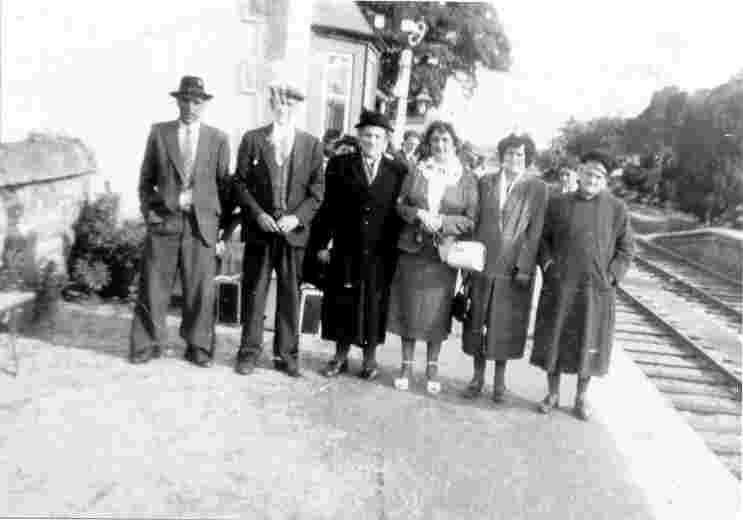
Kiltimagh
Railway Station
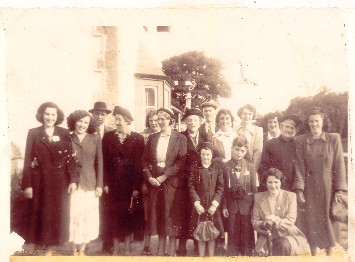
Noreen
Egan, Noreen Lavin, Billy Moran, Mary Halligan,
Kathleen Moran, Mag Campbell, Mag
Brennan, Mick Moran,
Aunt Nora, Mary Brennan, Katie Egan, Babe, Kathleen Egan,
Mary Moran, Billy Jones, Winnie Meenaghan.

Moran Family - Farwell to Nora
It was always a silent trip home and everywhere would seem very quiet for a
few days, then a letter would come to say they arrived safely, so the mood
would change and we would start to look forward to the next event.
We usually got our fair share of frost and snow. In 1947 on New Year's Day,
we had a snow storm with drifts covering the little cottages. With any sign
of snow they always kept a shovel indoors. On that occasion I can remember my
father digging his way out of the house and clearing a path to make his way
to the stables to check on the animals. The snow didn't clear from the hills
that year until the middle of May. Snow and frost always provided good
entertainment for the youngsters. There was snowballing of course and snow rolling, a large snowball would be rolled down the steep
hill at the back of the village, collecting more snow on its way, so a giant
snow ball would crash on to the ground below.
The best entertainment of all was of course the slide, taking advantage of
the slope running down from the road over the bridge into Ballinacurry
and the incline up to Maut's House,
it provided a perfect place for a slide. But this had to be prepared and
maintained; the path had to be brushed and cleaned at the first sign of frost
and a watchful eye had to be kept on it also, as Ellen Garvey wasn't too
happy with this pastime. Who could blame her?
Ellen had reared her family and now she was confronted with at least a dozen
teenagers sliding down the slope which took them up the incline by her gable
end. When all was quiet, she would come out and pour salt on our slide but
there was always someone on guard with a bucket of water to wash the salt
away. I'm afraid Ellen was in the minority and the slide went ahead often
until midnight. We would use seats of old chairs for sledges. If one can
imagine the noise we made when congregated. Poor Ellen must have been
demented.
This delightful pastime would come to an end when the thaw came and as each
young individual left home, of course there was less and less interest. After
a few years, the numbers had decreased down to 3 or 4. Immigration took its
toll on our village.
While we had been enjoying the seasonable weather, so also had the men. My
father always kept a couple of greyhounds as well as a couple of working
dogs. This could pose a problem occasionally as each dog should be licensed.
Half a crown per dog, well this was out of the question as they could ill
afford it. One dog had a license that was it. So when the Guard's Hat was
seen coming over the brow of the hill the kids ran from house to house to
warn neighbours, so the illegal dogs were taken for a long run into the
fields. Problem solved until the next time.
When the first covering of snow arrived the men donned their boots and
leggings (shaped laced leather covering from the instep to the knee), which
keep the trousers dry. Hob nailed boots were worn to prevent slipping. There
were 150 acres of common land at the back of the village, which was available
to the people of the village to graze their cattle freely. It was on this
commonage the men would go tracking hare in the snow. This was a sport in
itself, and would also provide meals for the families. It was also a good
topic of conversation each night as they congregated. Every detail of the
hunt would be discussed and a verdict of whose dog gave the best performance
was reached. The winter months slipped lazily by and all the sports came to
an end.
We approached Spring with mixed feelings. Early mornings and hard work ahead
but with it came new life and new beginnings as we roamed off to the fields
at dawn, with the haze covering the valley below. Just the chimneys of the
houses peeping through, it was sheer magic. The birds sang while preparing
nests for their new families.
Donkeys are braying in unison in the distant fields as if to say 'we're ready
come and get us' and we did and it started all over again.
During the day we could hear the ting-a-ling of tin cans, drinking saucepans
and galvanise buckets all clanging together. We knew the tinkers had arrived
to sell their wares, they wouldn't have a problem in
doing so they were very welcome visitors as these utensils were vital for use
on the farm, tin cans for milking the cows. Buckets for mixing pig feed, the
drinking saucepans for the children. Crockery or 'delph'
as they called was expensive and was not to be given to children.
Once again the families started to return home for their summer holidays. It
was more exciting for us this year of 1952 as Kathleen and her husband George
Evans were returning for the first time with their two children Maureen four
and Brian two.
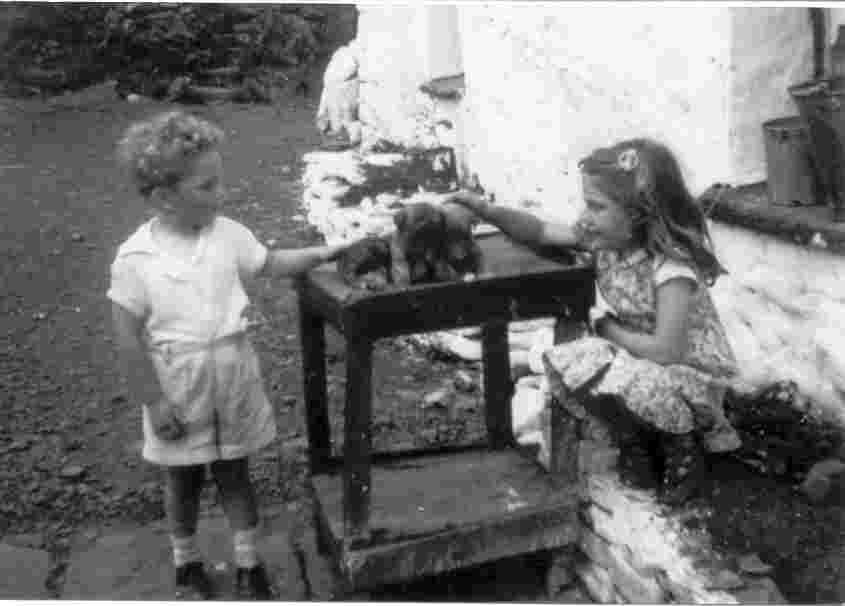
Maureen and Brian
Evans

George in Training
I described earlier George as
a Canadian so the whole village would be in awe of this man. The world was a
much bigger place in those days. To us, Canada could well have been near
the moon.
There was always a big clean up in spring and early summer with the houses
looking very drab after a long dreary winter. Each house was white-washed
inside and out, the ingredient used here was lime mixed to a paste with
water. Each village had a kiln to burn the limestone to extract the white
lime powder. With newly thatched houses and two nicely white washed chimneys
these could be seen from far and near. We used to be very proud when the
people from other villages commented on how nice our cottages looked. This
year though because of the return of the first immigrant family, there was
extra special attention to detail. Flowers were growing where weeds would be
the norm. With the dash of sunshine on the nasturtiums climbing up the front
of the cottages, it was truly a sight to behold.
So the day was here for George and Kath to arrive. They'd hired a car in Dublin and drove up to
Mayo. They arrived at the 'shop' around 10pm. As a rule the suitcases would
be carried up the hill but with 2 children who would also expect to be
carried, this wasn't going to be easy. There was no communication with this
family once they left England
so we had no idea what time they would arrive otherwise we could have met
them at the 'shop'. No mobile phones in those days, no phones for that
matter. Kath said to George we are going to have to leave the car here and
walk. Nobody drives up the hill except maybe the doctor on one or two
occasions in an emergency and that was in the daylight. George got back in
the car and said 'I'm not ruddy walking'. So they started the climb around
all the zig zag corners
and he made it to the top arrived outside our houses to a hero's welcome from
all the villagers. They took him to their hearts.
George and Kath were regular visitors after that until they emigrated to Canada in 1956.
I think George changed the face of history in Lackafinna
as a result of this determination. Cars were common place in the village when
visitors came from abroad.
Bridie introduced her husband Stephen Kelly to the
villagers with their hire car. Mike also arrived home with his wife Philomena
Lynch. He drove his hire car from Phil's home place of Shannagolden
in County Limerick.
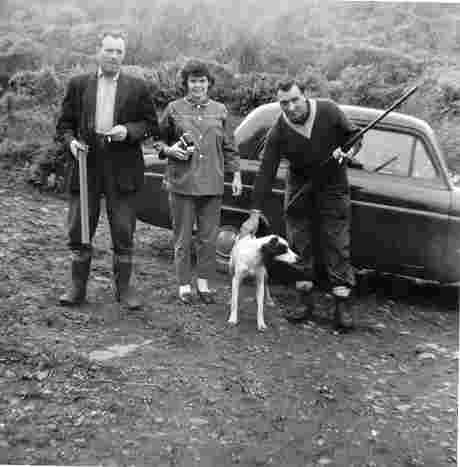
Owen, Phil, Mike & Tim the Dog
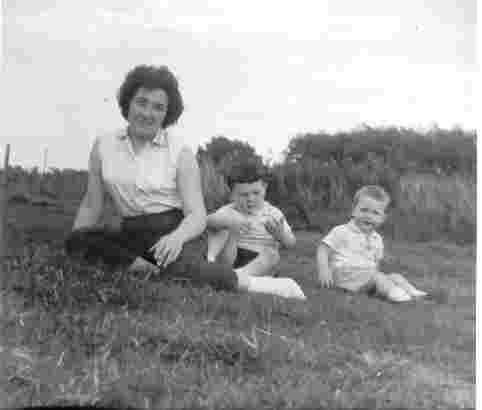
Noreen, Kieran and Eamon
Kelly
It was in the 1950s things
started to change drastically for the village. The electric light was
installed, a big project as the poles had to be erected at different points
all the way up the hill. There would be no more paraffin lamps and candles,
which had provided lighting throughout the ages. What a step forward to the
delight of all of us. Battery radios were
replaced with electric. On the day of the switch on, I can remember my mother
nearly drowning the workmen with holy water, she was so grateful. We got to
know those men quite well as they prepared everything for this memorable day.
We were so contented now, reading which we did a lot of. Sewing and knitting
was so much easier now, with light from the 100 watt bulb.
Good news ahead also when Corbett Shannon bought a tractor for his son Jack.
The plan was that Jack would cut hay for local farmers and also draw it home
for them in his trailer. There would be no more slavery cutting grass with
the scythe or digging the fields which some people had to do who didn't have
access to a horse and plough.
Jack did all this with his tractor. The donkey's and leaders were redundant
except for use in the small fields, which couldn't be reached any other way.
This plan was so successful that Corbett bought another tractor for his other
son Peter. Both boys made a living in Ireland and never had to
emigrate. Life certainly was easier for us in Lackafinna.
The introduction of the tractors came just at the right time with parents
getting older and families leaving home. There just wasn't anybody left that
would do the work of yesteryear.
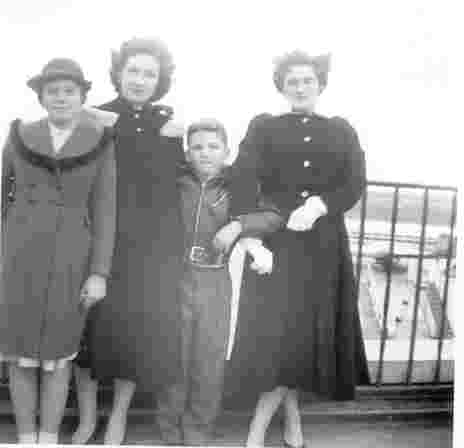
Growing Up
The village where John, Andy
and John Gill were alerted by the fairy bush (Blackthorn) shaking, then out
pops a leprechaun and also shook himself as he
straightened himself up in front of their eyes. I don't know if the gave them
the pot of gold or not but I would hazard a guess that they didn't wait
around for the presentation. Those were some of the stories. What with fairy
rings in the ring fort and each dark corner with its own dark secret or its
own ghost possibly?

The Fairy Tree
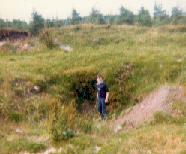 Lackafinna Ringfort Lackafinna Ringfort
Lackafinna (or Laga Mhuine, meaning - 'White Stones') is situated south of an
ancient ringfort, or fortified village also known
as a 'rath', 'dun' or 'lios'.
Ringforts are usually circular fortifications dating from the
early Christian period between 500 - 1100 AD. Within them a community of
families, or Clan, enjoyed the protection from
a man-made earthen rampart. In the
centre was a tunnel or 'souterrain' which was used
both as a refuge and cold store.
The picture shows Paul Glynn standing at
the entrance to the Souterrain in Lackafinna ringfort. Above him
(in front of the pine trees) can be seen a circular earth mound. In early ringforts this would have been topped with a wooden fence
system, later to be replaced by a drystone wall.
It's possible that Lackafinna
took its name from the abundant supply of white limestone used to make up
this ringfort. Some of these stones may well have
been used in the construction of the village of Lackafinna itself.
My memories are of course of
more recent times, when the village was alive with laughter and song. Sunday
would be a quiet day for older people. I can remember the stillness in the
house as my parents scanned the papers from cover to cover my mother would end
up entering the fashion competition in the Sunday People. My father would
smile and say 'she's got her head in the clouds'. He had his feet firmly on
the ground though while he read the Sunday Independent. He could later relate
with such clarity everything he had read.
He had his own opinions especially on politics and the Second World War which
was raging when I was a child. Churchill, Montgomery and Hitler were on
everybody's lips when they were all gathered around the fire and discussed
the war and its progress. I was always in their midst as everywhere my father
went I followed. It wasn't a pleasant topic when they discussed the war. I
used to be terrified. I was too young to be listening to these conversations
least of all understand them. There was one gift I had though and that was a
great imagination. It would have been after one of those meetings and still
fresh in my mind. I was sent to deliver the lunch to my father and brothers
in the bog field, it was a lonely journey anyway.
Leaving the village behind, the ring fort situated only a few yards away from
this road I was travelling. Folklore would have it that the fairies danced
merrily there underground. A happy scene you might think but I was never keen
on meeting any of they if they ever popped up for
air.
As I made my way with the bottles of tea inserted in a woollen sock to keep
warm. If the boys had been poaching the night before, they could have fresh
water trout or salmon accompanied by freshly baked soda bread. That was on a
good day. Other days they might have cheese or if they were lucky they might
have tomatoes that were grown in the greenhouses at the convent in Ballinamore and then sold to the local shops. Tinned
corned beef was always a cheap option in those days. On the day in question
as I was making my way with the lunch bag I heard a plane approaching. Just
over my head, the pilot decided to do a u-turn. That was it down went the bag
bottles and all. I fled and arrived home crying to my mother. The Germans are
coming to get us. I wasn't very popular with the brothers but my parents
understood as they do after I couldn't have been more than seven or eight at
the time.
I make no apologies for describing my father as being some kind of super man,
in my eyes he was of course but he was human although he had been showered
with may gifts which we all benefited from. He also had a short fuse, and
sparks would fly now and again if thing didn't go his way.
In the course of his daily DIY tasks, he would leave his hammer down and
return later and want to know who moved. We would all scurry around looking
for it while he ranted on. Eventually he would pick up from exactly the same
place he had left it.
With no apologies forthcoming he would sit and fill his pipe and light up.

In the meantime my mother is trying to justify the chain of events. She would
say 'It's best to humour him'. However bad it is with him, we would be worse
without him. He enjoyed his smoke and we all lived to fight another day.
|










